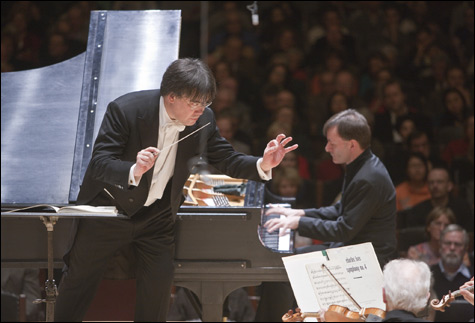
UNSCHMALTZY RESTRAINT: Performing with Alan Gilbert and the BSO, British pianist Stephen Hough also brought passion and wit to Rachmaninov’s Rhapsody on a Theme by Paganini. |
Charles Ives's Fourth Symphony is a stunner. And Boston Symphony Orchestra guest conductor Alan Gilbert, the New York Philharmonic's music director designate, along with former Cleveland Orchestra assistant conductor Andrew Grams (it's the kind of piece that requires at least two conductors), led a stunning performance, the BSO's first in 17 years. Ives himself never lived to hear the piece played complete, though he essentially finished it in 1916, 38 years before he died and half a century before its eventual world premiere. He left the score in something of a shambles. Parts of it had to be reassembled from scattered manuscript pages; he mentions alternate or optional instruments (quarter-tone piano, "ether organ"). Performances have been given both with and without a chorus. The BSO used an electronic theremin (played by composer/pianist/thereminist Dalit Warshaw) and a reduced Tanglewood Festival Chorus, and it placed Ives's "distant choir" of strings and harps not off stage but in the first balcony.
Ives biographer Jan Swafford wrote in his eloquent program note that this symphony "put forth a vision of the whole of human existence" — for Ives, a pilgrimage "from worldly to sublime." In the first movement, the composer tells us, "the spirit of man" asks "What? and Why? . . . The three succeeding movements are the diverse answers in which existence replies."

The second-movement "Comedy" (Swafford calls it a "pandemonic scherzo") is based on Hawthorne's allegorical fantasy "The Celestial Railroad," in which pilgrims on their way to the Celestial City get derailed at Vanity Fair, which Ives makes sound a lot like midtown Manhattan (in Swafford's words "an apocalyptic traffic jam"); it ends in hilariously ragged disarray. The third-movement, "Fugue," takes us to a New England church, solemn music, with organ, based on the beautiful hymn "From Greenland's Icy Mountains" and ending with a trombone solo. But the fourth movement aspires to something more mystical than church. All Heaven breaks loose. Theremin, organ, piano (the brilliant Ives interpreter Stephen Drury), a two-story-high set of gongs, harps, and violins in the balcony, the chorus wordlessly intoning "Nearer, My God, to Thee" — a holy cacophony in only some ways opposite to the Hellish uproar of Vanity Fair. In little more than half an hour, the performance became one of those rare transporting experiences.
Gilbert opened with one of Sibelius's least-known "symphonic poems," Night Ride and Sunrise, which traces another journey from darkness to an ecstatic morning-after. This was its first BSO performance since the great Karl Muck led it in 1918. Sibelius precedes the minimalists in his insistent repetitions (here a kind of steady gallop), but Gilbert didn't suggest much mystery, and the journey seemed longer than it should have. The orchestra became more animated in Rachmaninov's Rhapsody on a Theme of Paganini, with British pianist Stephen Hough playing the composer's most famous — and most gorgeous — piano theme with unschmaltzy restraint and delicacy and also passion and wit.
Pilgrimage was likewise the subject of the March 2 Collage New Music concert at the Longy School, which began with Southern California composer Donald Crockett's fresh 1988 piano piece called Pilgrimage. Clearly organized sections, played with muscular power by Christopher Oldfather (Collage music director David Hoose was the distinguished page turner), marked a propulsive search to complete the well-worn musical motif B-A-C-H. (In German notation, "B" is B flat and "H" is B natural.)
The program ended with another Pilgrimage, the late Andrew Imbrie's 1983 Collage commission. Imbrie is a Hoose favorite: he'd been part of the previous Collage concert, and at this concert Oldfather and BSO violinist Catherine French played his 1997 Chicago Bells, which ended with a searching Lento. For me, he's been a blind spot. Although I admire the compositional skill, I suspect his scores would be more interesting to read than to hear. I can't warm to his emotional detachment, and the essential sequences of notes (a/k/a melody) just don't get under my skin. Yet the densely composed Pilgrimage, for flute/piccolo (Christopher Krueger), clarinet/bass clarinet (Robert Annis), percussion (Craig McNutt), violin (French), cello (Joel Moerschel), and piano (Oldfather), like the Lento of Chicago Bells, moved me with its seriousness and conviction.
The concert also included two pieces by Tobias Picker: Two Songs, a setting of W.S. Merwin poems from a longer cycle that seemed to aspire to the conventional harmonies of Samuel Barber without Barber's uncanny melodic inspiration, and The Blue Hula, which has a section too close for comfort to Stravinsky's Ragtime. These were sung by their dedicatee, new-music soprano Judith Bettina, who later returned for the premiere of David Rakowski's six Phillis Levin Songs, a new Collage commission. Bettina had suggested several of Levin's poems to Rakowski, but neither she (still visibly counting) nor Rakowski seemed to connect with or illuminate these poems about love, nature, time, and words. Rakowski's startling and colorful music might better have been left untrammeled by any vocal line at all.